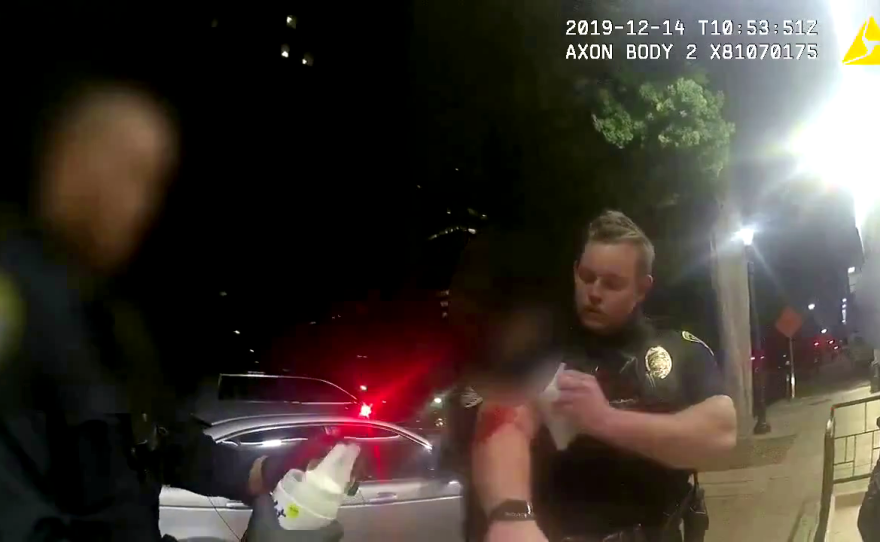Part two of a three-part series. Read part one here.
Editor's Note: This story contains graphic descriptions and images of violence.
In the early morning hours on a Saturday in December 2019, San Diego Police Officer Dillon Fuston was investigating a stabbing downtown when he got a call about a broken window at a nearby storefront. Fuston found a 20-year-old Black man and tried to arrest him.
According to police documents, the man head-butted Fuston in the face. Fuston, who is white, then used force on him in multiple ways that violated police policy and risked the man’s life, police training manuals show.
Fuston held the man in a carotid restraint for 38 seconds — restraints should last no more than 15 seconds — and at one point slipped into a chokehold, which is off-limits except for life-threatening situations, according to department policy.
Fuston, a 270-pound officer and former Marine, then placed his hand on the back of the suspect’s head, a technique that is expressly prohibited because it can paralyze or even kill a suspect. He held it there for 57 seconds, according to the police Internal Affairs investigation and body camera video. Another officer on the scene told Fuston to stop multiple times, but he didn’t listen.
The suspect eventually lost consciousness. As it turns out, he hadn’t broken the window like police thought. It was broken by accident when he was stabbed earlier that night.
A lawsuit later filed by the young man said when he “regained consciousness, he was lying on the sidewalk with his hands handcuffed behind his back, a bag over his head and profusely bleeding from the wounds from being beaten and stabbed earlier that morning.”
Police internal investigators later found Fuston’s use of force was excessive. But the public will likely never know whether Fuston was disciplined.

‘It’s like it never happened’
Under new state laws, San Diego police have released records from more than 90 cases of officer misconduct, but a third of those cases are missing disciplinary outcomes. And for some of these officers, including Fuston, that means their disciplinary history isn’t following them throughout their careers in law enforcement.
Fuston left the San Diego Police Department two years after the incident and got a new job in September at the San Diego Sheriff’s Department. Another officer who had disciplinary records missing from his misconduct case went on to get a job at the El Cajon Police Department, according to a joint KPBS-inewsource analysis.
Retired La Mesa Police Capt. Dan Willis is an expert on police culture and psychology and said one reason the discipline records wouldn’t be in officers’ files is because they received informal discipline. Those records are supposed to be deleted after set amounts of time.
“So it's like it never happened, there's no record of it anywhere,” he said. “So you could have somebody who tells a new department, ‘Hey, I've never been disciplined for anything because their records all been purged because they've been good for the last five years. And there would be no way to verify that.”
If disciplinary records aren’t in an officer’s personnel file, they could find new jobs without having those details disclosed to future employers. The Sheriff’s Department would not say what records it reviewed or had access to when hiring Fuston.
“We are unable to provide comments or information related to any internal affairs investigations or discuss any confidential personnel records,” said Sheriff’s spokesperson Lt. Amber Baggs.
When reached by phone, Fuston declined to comment.
No specific explanations
The San Diego Police Department refused to clarify why disciplinary action was missing from specific case files. Capt. Jeff Jordon, who oversees records for the department, said discipline records are only retained for three years after an officer leaves the force. But that doesn’t explain why Fuston’s records are missing — he only left last year.
In fact, of the 30 cases missing discipline records, about half are for officers still on the force. For example, in 2019, an officer pulled a woman out of a police vehicle aggressively, and in 2020, another officer pressed his elbow into a suspect’s head for 40 seconds. Both cases have no disciplinary files in them, and both officers are still working for San Diego police.
Twelve of the cases missing discipline records are for discrimination, and five of those officers remain on the force. In one incident from 2017, an officer told an inmate to walk to the back of the bus like Rosa Parks. In 2013, a different officer made sexist comments to women in the department, telling them their jobs were to have babies. Those officers are still employed by San Diego police, too.
Jordon said current officers, and those who left recently, may not have discipline in their files if the discipline was “informal,” like in the case of a verbal or written warning. Records of written warnings are sealed after one year and destroyed after two, according to the department’s discipline handbook.
The department said it will update the handbook based on new laws like SB 16, which now requires investigative files to be maintained for 15 years.

‘They don’t get a consequence’
The lack of disciplinary information is jarring to people like Abraham Jarvis, an 18-year-old at Lincoln High School who has several open complaints against San Diego Police officers. He said he’s lost count of how many times he’s been pulled over and is now afraid to drive.
“I would take the freeways just to get my little brother from my auntie’s house because I didn’t want to take the roads where they could pull me over,” he said. “It’s been tough.”
His mother, Evelia Jarvis, doesn’t think the department is taking their complaints seriously. She said her family has filed multiple complaints, and now she’s scared about what could happen to Abraham at the hands of police. That’s why she and Abraham agreed he should join the Army.
“Just the fear, the fear of knowing that anytime he’s out and about they can do anything and get away with it,” she said. “They don’t get a consequence.”
Part three of this series will explore the limitations of police transparency laws and the ongoing efforts to make police records more accessible to the public. Read it here.








